
The Sex Pistols were an English punk rock band formed in London in 1975. Although their initial career lasted just two and a half years, they became one of the most culturally influential acts in popular music. The band initiated the punk movement in the United Kingdom and inspired many later punk, post-punk and alternative rock musicians, while their clothing and hairstyles were a significant influence on the early punk image.

John Simon Ritchie, better known by his stage name Sid Vicious, was an English musician, best known as the bassist for the punk rock band Sex Pistols. Despite dying in 1979 at age 21, he remains an icon of the punk subculture; one of his friends noted that he embodied "everything in punk that was dark, decadent and nihilistic."

Glen Matlock is an English musician, best known for being the bass guitarist in the original line-up of the punk rock band the Sex Pistols. He is credited as a songwriter on 10 of the 12 songs on the Sex Pistols' only officially released studio album, Never Mind the Bollocks, Here's the Sex Pistols, although he had left the band early in the recording process, credited as bassist and backing vocalist on only one song on the album, "Anarchy in the U.K.". However, on the bootleg album Spunk, Matlock played bass on all the songs, which included earlier studio recordings of 10 of the 12 songs that later appeared on the Bollocks album.

Never Mind the Bollocks, Here's the Sex Pistols is the only studio album by English punk rock band the Sex Pistols, released on 28 October 1977 through Virgin Records in the UK and on 11 November 1977 through Warner Bros. Records in the US. As a result of the Sex Pistols' volatile internal relationships, the band's lineup saw changes during the recording of the album. Original bass guitarist Glen Matlock left the band early in the recording process, and while he is credited as a co-writer on all but two of the tracks, he only played bass and sang backing vocals on one track, "Anarchy in the U.K." Recording sessions continued with a new bass player, Sid Vicious, who is credited on two of the songs written by the band after he joined. While Vicious's bass playing appeared on two tracks, his lack of skill on the instrument meant that many of the tracks were recorded with guitarist Steve Jones playing bass instead. Drummer Paul Cook, Jones and singer Johnny Rotten appear on every track. The various recording sessions were led alternately by Chris Thomas or Bill Price, and sometimes both together, but as the songs on the final albums often combined mixes from different sessions, or were poorly documented who was present in the recording booth at the time, each song is jointly credited to both producers.

"Anarchy in the U.K." is a song by English punk rock band the Sex Pistols. It was released as the band's debut single on 26 November 1976 and was later featured on their album Never Mind the Bollocks, Here's the Sex Pistols. "Anarchy in the U.K." was number 56 on Rolling Stone magazine's list of the 500 Greatest Songs of All Time and is included in the Rock and Roll Hall of Fame's 500 Songs That Shaped Rock and Roll.

"God Save the Queen" is a song by the English punk rock band the Sex Pistols. It was released as the band's second single and was later included on their only studio album, Never Mind the Bollocks, Here's the Sex Pistols. The song was released during Queen Elizabeth II's Silver Jubilee in 1977.
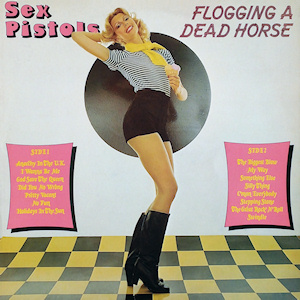
Flogging a Dead Horse is a compilation album of singles by Sex Pistols, released after their break-up, and includes the four songs issued as singles A-sides that were included on Never Mind the Bollocks, Here's the Sex Pistols, three of their B-sides, and the six A-sides taken from The Great Rock 'n' Roll Swindle and one B-side, "My Way".
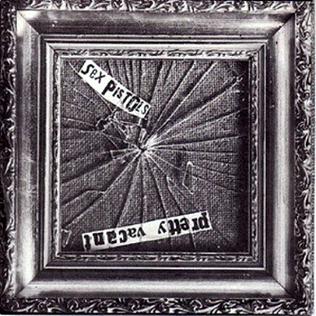
"Pretty Vacant" is a song by the English punk rock band the Sex Pistols. It was released on 2 July 1977 as the band's third single and was later featured on their only album, Never Mind the Bollocks, Here's the Sex Pistols, released during that same year. It is the first song written by the band.

Sid Sings is the first released solo live album by English punk rock musician Sid Vicious. It was released posthumously in 1979 and entered the British album charts on 15 December where it peaked at number 30.
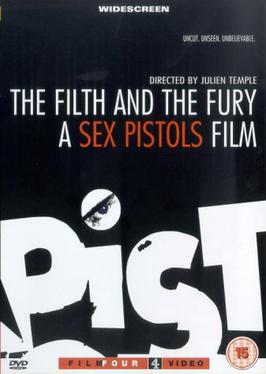
The Filth and the Fury is a 2000 British rockumentary film directed by Julien Temple. It follows the story of punk rock pioneers the Sex Pistols from their humble beginnings in London's Shepherd's Bush to their fall at the Winterland Ballroom in San Francisco. It is considered a continuation of Temple's first documentary centered on the band, titled The Great Rock and Roll Swindle, but acts as an opportunity for the surviving members of the group to tell their side of the story.
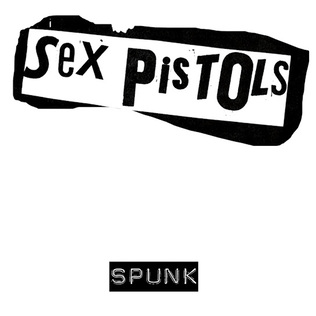
Spunk is a bootleg demo album by the English punk rock band the Sex Pistols. It was originally released in the United Kingdom during September or October 1977.
Dave Goodman was a record producer and musician, perhaps best known as the live sound engineer for Sex Pistols, and the producer of three of their studio demo sessions.

The Swindle Continues is the first album released by the Ex Pistols in 1988. It consists of half Sex Pistols and half Ex Pistols material, and is the only Ex Pistols release that doesn't disguise itself as material completely by the Sex Pistols.

Sex Pistols is a box set anthology of the career of the punk band The Sex Pistols with singer Johnny Rotten. It was released on 3 June 2002. The set comprises three themed CDs and an 80-page booklet.

Anarchy in the UK: Live at the 76 Club is a live album by the English punk rock band the Sex Pistols. It was recorded live at the 76 Club in Burton upon Trent. Prior to its formal release, the album had made its way around Sex Pistols fans as a bootleg, most commonly under the title Indecent Exposure in which form it was first issued in 1978, though the number of tracks included varies. In 2001 the album was remastered and re-released on Yeaah Records as "The 76 Club".

Spunk/This is Crap is a rarities album by the English punk rock band The Sex Pistols. It was included with the 1996 reissue of Never Mind the Bollocks, Here's the Sex Pistols.

Jubilee is a Sex Pistols singles compilation issued in 2002 to celebrate the Sex Pistols' 25th anniversary Jubilee.
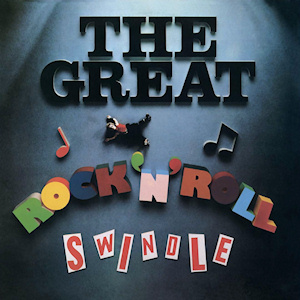
The Great Rock 'n' Roll Swindle is the soundtrack album of the film of the same name by the Sex Pistols.
There'll Always Be an England is a 2008 concert film and documentary featuring the Sex Pistols.
"E.M.I." is a song on the Sex Pistols' 1977 debut album, Never Mind the Bollocks, Here’s the Sex Pistols. It was written after the group's contract with record label EMI had been terminated on 6 January 1977 after only three months, following the publicity storm caused by their appearance on the Today programme in December 1976. The song, often called a diss track, mocks the label for wanting to cash in on the growing punk phenomenon and sign the band, only to drop them when the group's antics damaged the label's reputation. The song was first recorded the same month at Gooseberry Studios, in Glen Matlock's last recording session with the band before his departure, but the version that appears on the album was a re-recording made two months later at Wessex Studios. It was first played live at Notre Dame Hall, London, on 21 March 1977.
















